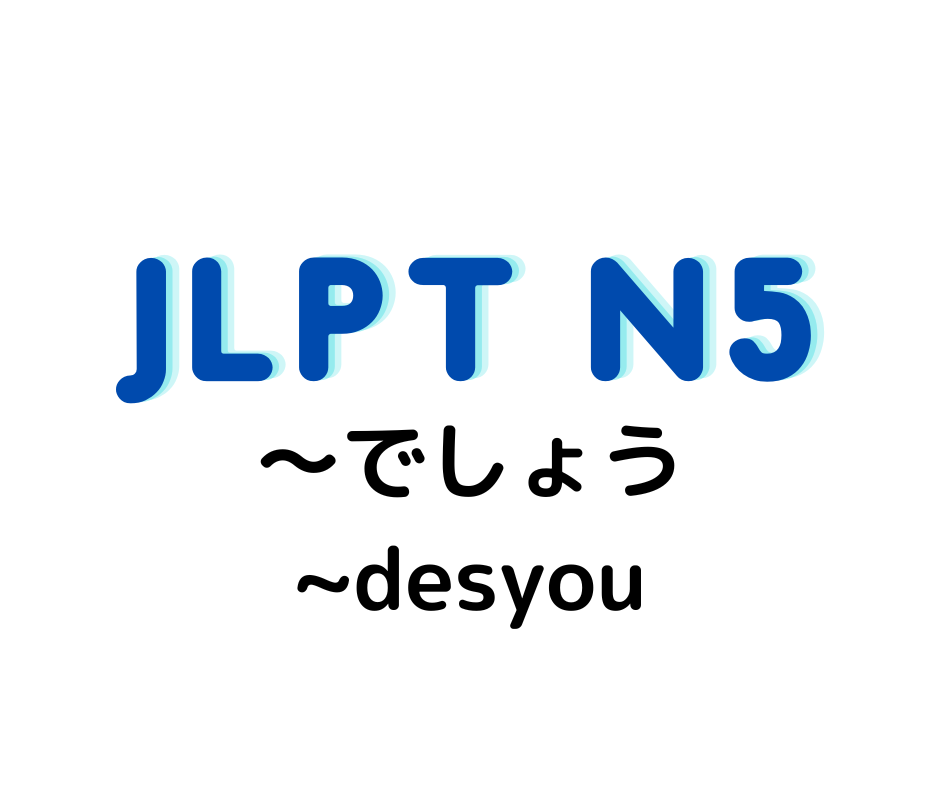sentence pattern: 〜でしょう/~desyou
Grammar Type:
Auxiliary Expression
Essential Meaning:
Probably / Right? (expressing unfounded conjecture)
Construction:
(Verb / い-Adjective) informal + だろう
E.g. 話はなすだろう [X probably speaks]
E.g. 高たかいだろう [X is probably expensive]
な-Adjective stem / Noun + (だった) + だろう
E.g. 静しずかだろう [X is probably quiet]
E.g. 先生せんせいだっただろう [X was probably a teacher]
NOTE
- だろう expresses informal conjecture that is not based on any particular information or evidence. The formal variant of だろう is でしょう.
- だろう / でしょう sometimes pairs with probability adverbs such as たぶん [Probably] or きっと [Certainly] to express the speaker’s confidence that something will / will not happen or that something is / is not the case.
- E.g. アンダーソンさんはたぶん日本へ行くだろう。[Mr. Anderson will probably go to Japan.]
- E.g. アンダーソンさんはきっと日本へ行くだろう。[I’m almost certain that Mr. Anderson will go to Japan.]
- In interrogative sentences, だろう / でしょう serves to soften questions and make them less direct (and thereby more formal). It generally conveys the idea of “I wonder…”
- E.g. 大丈夫ですか。[Is it all right?]
- E.g. 大丈夫でしょうか。[I wonder if it’s alright?]
- だろう can be articulated with rising inflection to seek agreement from the hearer. This is softer and more polite than the sentence-final particle ね.
- E.g. 君も行くだろう? [You’ll go too, right?]
- E.g. これ、きれいでしょう? [This is pretty, don’t you think?]
Example Sentences
あのアパートは高たかいでしょう。
That apartment is probably expensive.
ロジャーはスキーが上手じょうずだろう。
Roger is probably good at skiing.
あの人は中国人ちゅうごくじんだろう。
That person is probably Chinese.
A:ねぇ、冷蔵庫にあった私のケーキ食べたでしょう?
A: Hey, did you eat my cake in the fridge?
B:知らないよ。
B: I don’t know.
A:今、私の話してたでしょう?何話してたの?
A: You were talking about me, weren’t you? what were you talking about
B:何も話ていないよ。
B: I didn’t say anything.
A:嘘だー。絶対話してたよ。
A: You’re lying. I was definitely talking
A:あれー、私のスマホどこ?
A: Um, where is my smartphone?
B:机の上にあるでしょう?
B: It’s on the desk, right?
A:トムさんってラーメンが好きでしょう?
A:Tom likes ramen, right?
B:うん、どうして?
B: Yes, why?
A:駅前に美味しいラーメン屋さんがあるんだけど、一緒に行かない?
A: There is a delicious ramen shop in front of the station, would you like to go with me?
B:いいよ。
B: Good.
A:これ、昨日彼氏にもらったんだ。いいでしょう?
A: I got this from my boyfriend yesterday. okay?
B:え〜、いいなあ。
B: Eh, nice.
A:これ、北海道で買ったお土産。
A: This is a souvenir I bought in Hokkaido.
B:美味しそう。
B: It looks delicious.
A:美味しいよ。どうぞ食べて。
A: It’s delicious. Please eat.
B:わぁ、美味しい!
B: Wow, delicious!
A:(おいしい)でしょう?
A: (delicious) right?



コメント
Wow, this piece of writing is pleasant, my younger sister
is analyzing these kinds of things, so I am going to convey her.